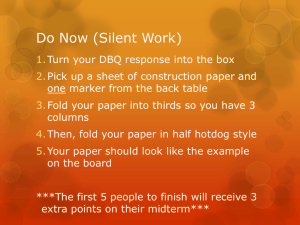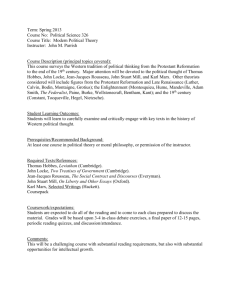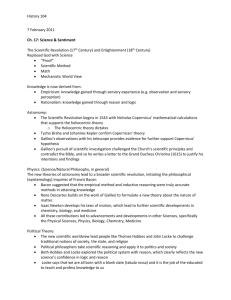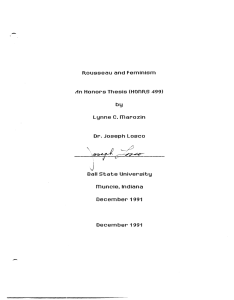Jean-Jacques Rousseau (1712-1778) Man is innately good.
advertisement
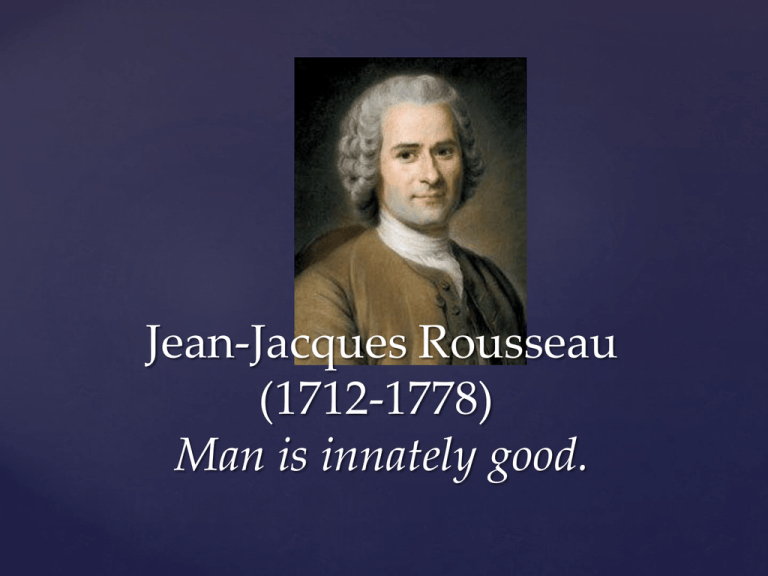
Jean-Jacques Rousseau (1712-1778) Man is innately good. If we were to look at the things you and I assume are "true", and we were to make a list of the men who thought of those ideas, Rousseau would rank up there with Plato and Aristotle, Newton, Jefferson, and even Paul and Christ. Yet unlike these other seminal figures, Rousseau seems to have invented his world view -- the one most of us now accept -- from whole clothe, alone, and against the currents of everyone else around him. He is truly the individual genius who radically alters the way all others think and feel. His basic thesis: man is naturally good, and anything that is not natural has corrupted us from this natural state. Like Locke's tabula rasa, all Romantic philosophy and sensibility stems from this single, radical idea. The Noble Savage This idea is in turn rooted in the fact that we feel before we think -- that emotion is natural and thinking a product of social conditioning -- suffering is caused by our struggle to reconcile our "true" emotional selves with social expectations. "God makes all things good; man meddles with them and they become evil. He forces one soil to yield the products of another, one tree to bear another's fruit. [...] He destroys and defaces all things; he loves all that is deformed and monstrous; he will have nothing as nature made it, not even man himself, who must learn his paces lie a saddle-horse, and be shaped to his master's taste like the trees in his garden.” - Emile In stark contrast to Enlightenment rationality, Rousseau emphasis the primacy of emotion as a means of attending the Truth. Emotion is natural and precedes Locke's Experience and Reflection, and what is natural is Godly and therefore good. This is perhaps his biggest contribution to modern thinking. Emotion Authorities tend to punish the inherently innocent and good Physical punishment does not lead to rehabilitation (or education) Justice All behavior (as well as Locke's "Human Understanding" or knowledge) is learned. This includes sexual perversion, criminal mind and criminal behavior Education Is created by social injustice. Generally, the criminal is the inherently good individual who has been corrupted by the forces of an unjust or selfish authority, including other, more powerful individuals, or the church or government or other institutions. Crime a) "amour de soi" or self love. We share this trait with all animals and it's what we now would call the instinct of self preservation b) "amour propre" is a contaminated version of "self love": This is selfish love in which we privilege our own desires over the needs of others. He believes it's not natural but caused by social forces (see below) c) "pité" or compassion or empathy: This is Rousseau's radical step: love -- love of others, compassion -- must have been natural or we would never have survived as a species. It exists before Locke's "reflection", that is: thinking or reason. Three Types of Love Rousseau offers our final step in constructing our modern conception of love – they way most of us see it today. Essentially he secularizes the Hebrew and Christian concept dictating that we a) love God with all our hearts and b) that we love one another as God loves us. Rousseau argued that love could save any of us now, here, in this world. Or, as John Lennon put it, “Love is all you need.” Love And Happiness Rousseau’s philosophy is generally called “Romanticism”, but it’s important to realize he was more interested in compassion for others than in what we now call “romantic” or sexual love. This raises the important question: does Mary Shelley confuse the two kinds of love, or does the Creature? Romantic Love Rousseau believed that it was “property” – the private ownership of things – that had caused mankind’s original fall from grace: the love of stuff corrupts our inherent love for one another. He believed that the closer we are to nature, the closer we are to God; this idea reversed the way Westerners had always envisioned our relationship to the natural world. His Social Contract concepts are fundamental to our conception of democracy and encoded in our Constitution. All five of his own children, born out of marriage, were sent to the orphanage, and he descended into mental illness in his later years. Last, Less Relevant Points

